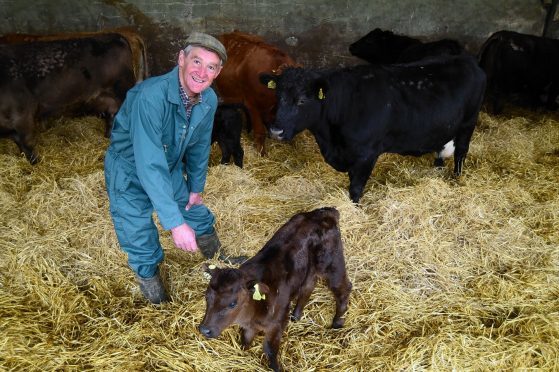Looking out from his kitchen window over a field of flowering oilseed rape, Peter Chapman admires two of his four 800kW wind turbines which take pride of place at South Redbog Farm, near Strichen.
The 66-year-old, who was recently elected as a regional list Tory MSP for the north-east, first got involved in politics in the late 1980s when he attended his first NFU Scotland meeting.
Fast forward nearly 30 years, the Buchan farmer will now be hanging up his boiler suit and wellies to focus on his new parliamentary appointment.
His son, also named Peter, will take on the reigns of the 1,100-acre farm which comprises an arable enterprise, a beef suckler herd and pullet-rearing sheds.
Prior to taking on his new role, Mr Chapman served as an NFU Scotland branch chairman, did a two-year stint as the union’s vice-president, served for six years on the board of Scottish Natural Heritage, and most recently served as an Aberdeenshire councillor for five years. His wife Edie is currently the councillor for central Buchan.
He says his background and experience of being “right at the sharp end” of the industry should help him drive forward rural policy on behalf of the Tories.
“Being a farmer I do understand how tough it is out there,” said Mr Chapman.
“Being right at the sharp end does give you an insight into how difficult things have been over the last few months.”
He is referring to delays in receiving farm subsidy monies, caused by problems with the new government IT system designed to process applications and approve payments.
“It’s absolutely shocking. There’s been a catalogue of mistakes and failures right throughout the whole process,” said Mr Chapman, who along with his party colleagues is calling for a full public inquiry into the payments fiasco.
He goes so far as to say Richard Lochhead, who was rural affairs secretary up until the recent elections and responsible for overseeing the new IT system’s development, has caused widespread damage to the farming community.
“That all happened on Richard Lochhead’s watch. The buck stops with him,” added Mr Chapman.
As well as calling for a public inquiry into the debacle and putting pressure on government to get the remainder of payments out to farmers and crofters, Mr Chapman said another key priority will be to try and see what can be done to ensure primary producers are better rewarded by the food and drink supply chain.
“Long term I think we have got to try and get the marketplace working better for agriculture. The marketplace is not working for us [farmers]. We are taking too much of the risk and not getting enough recognition for the quality products we produce,” said Mr Chapman.
He admits he doesn’t have a silver bullet to solve the situation, but says he will push for the groceries code adjudicator to have more powers and also put pressure on government to ensure local authorities and health boards are sourcing as much local produce as possible.
Another priority will be pushing hard for government to base more of its decisions on science – Mr Chapman is very critical of the government’s decision to ban GM crops in Scotland, which was taken without scientific advice.
Lastly, Mr Chapman said he would do all he could to help dairy producers affected by Muller’s decision to shut its processing plant in Tullos, Aberdeen.
He said the dairy giant should not be charging producers 1.75p a litre to transport their milk south for processing, and said he would be writing to Cabinet Secretary for Rural Economy, Fergus Ewing, asking him to put pressure on Muller to remove the haulage cost.
